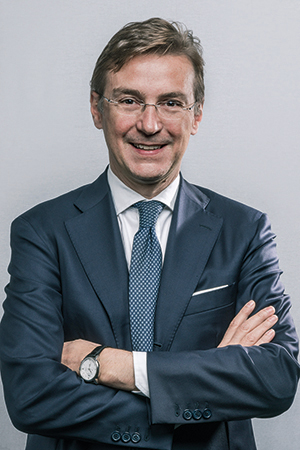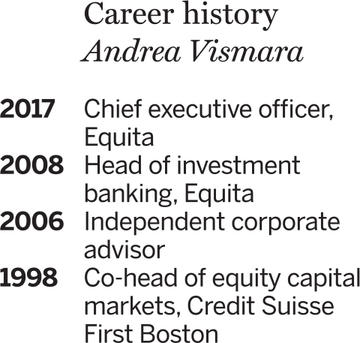Equita on plan to be independent advisor to Europe’s SMEs
Andrea Vismara, chief executive of Italian independent investment bank Equita, on seeking growth opportunities outside of its domestic market.
In an investment banking and capital landscape within Europe where the underserving of the continent’s small and medium-sized enterprises (SMEs) is an often-discussed theme, the Italian independent investment bank Equita is determined to serve this market, in addition to larger clients.
Andrea Vismara, chief executive of Equita, believes this group is overlooked by large US banks which have come to dominate the European investment banking landscape, and that there are no longer any “European champion” banks. He says, “It is really down to the few profitable and efficient players who can cover both the large caps and the small guys” to serve this group.
Mr Vismara describes Equita as a “rare [example of an] old-style independent investment bank”, which were plentiful until a couple of decades ago. Its model is very relationship-based and “centred on sales and trading, advisory and a little bit of asset management”.
Strength in independence
He believes that Equita’s independence, particularly within an Italian context where he feels the market is dominated by large investment banks, gives it a unique position. “The research that we publish and our judgement is not constrained by existing relationships with shareholders, so we do what we think is right. And our clients appreciate our independence of thought,” he says, adding that “when we advise companies, we’re very careful about our reputation.”
The company’s results during 2020 certainly suggest a strong vote of confidence from clients during a challenging period. In the nine months up to end-September, its net revenue was up 25% year-on-year and net profits increased by 56%. Mr Vismara puts the strong performance down to keeping close to clients throughout this period and proactively seeking to provide an up-to-the-minute “understanding of the Italian markets to international players and corporates”, as well as its involvement in a number of prominent transactions, including acting as an advisor in Intesa Sanpaolo’s takeover of UBI Banca. And because Equita does not engage in any lending activity, it has not been bogged down in any provisioning or non-performing loan issues.
Growth opportunities
Mr Vismara is keen to capitalise on this performance to generate further growth over the coming years.
“We will end 2020 with an improved reputation and higher market share, and well placed to take advantage of the growing confidence of entrepreneurs and managers going into 2021 to undertake strategic projects,” he says. “We’re fairly optimistic that with the overall economic outlook improving and, with our positioning in the market, we will do well next year. And then hopefully, we will also have the opportunity to look around for further growth opportunities.”
There are very few profitable and efficient European players that can operate in the mid-market segment
In November 2019, Equita published an ambitious three-year strategic plan. Despite the difficulties of 2020, Mr Vismara is pleased with how the bank is performing against that. He cites key opportunity areas as the anticipated continuation of the consolidation trend within European banking, with Equita being a leading player in advisory on such transactions — a current example being its involvement as an advisor to Credit Agricole on its tender offer for Italian bank, Credito Valtellinese, as well as opportunities within mergers and acquisitions (M&As) more broadly.
In July, Equita acquired the Italian M&A boutique advisory firm K Finance, further cementing its position as a leading M&A advisory firm within Italy. Mr Vismara is optimistic that this acquisition, and the additional resources it offers will provide the opportunity not only for “further growth within our domestic market, [but also the] opportunity to expand into Europe”.
Expansion in Europe
Mr Vismara returns to the theme of SME clients as a target growth area, believing that wide coverage at a European level is needed in order to be able to truly serve this group efficiently and profitably. He contrasts this with Equita’s current coverage, which “is mostly Italian and some European companies” at present. However, he is hopeful that there will be consolidation opportunities with other players which will allow the group to expand its European reach. Although there is nothing specific on the agenda right now, he observes that the environment for European consolidation is “accelerating”, so he expects there to be opportunities on the horizon which Equita will “actively consider”. He says: “We will also accelerate in that regard. But clearly we have to be very systematic and careful, and make sure that we choose opportunities that create long-term value for all stakeholders, not only on the financial side but also in a wider sense.”
He again cites the recent acquisition of K Finance as an example of an acquisition with wider benefits. The purchase enabled Equita to become part of Clairfield International, a global network of corporate finance boutiques, of which K Finance was one of five founding members in 2005. Being a part of the network will strengthen Equita’s ability to execute cross-border transactions.
“That whole concept of serving the European mid-market is a potential area for us to expand and to consider whether it would make sense for us to progressively become a European player,” he says. “There are very few players who can do that in Europe. There are many large European banks, many large US global banks, but very few profitable and efficient European players that can operate in the mid-market segment. There could be an opportunity for us to build something that has more ambition and more geographical reach.”
Supportive regulatory changes
At a European Commission (EC) level, there has been a renewed push under Ursula von der Leyen’s administration to achieve the objectives set out in the Capital Markets Union (CMU) agenda, key aims of which include increasing SME access to the capital markets, making it easier for capital to flow across borders within the EU and for banks to serve corporates based across the EU. It has long been recognised these are areas where policy and regulatory changes are needed, and for Mr Vismara it has had an impact on the development of the European investment banking sector. He says: “I think the wider European regulatory framework has not made it easy to build European champions.”
When it comes to the mid-market in particular he would like to see an EC that is “happy for countries to give tax benefits to investors who invest in small caps, simplifying listings for companies and possibly favouring smaller brokers, who are the ones covering a lot of smaller companies”. He adds that “the European regulators know perfectly well that small caps cannot be 100% served by bank lending, so there needs to be alternatives. And in order for those alternatives to be practicable, and really effective, there need to be players who really focus on those companies.”
Mr Vismara believes this is an area on which the EC is already focussing, citing the renewed CMU action plan which was published in September 2020 and the formation of a new technical expert stakeholder group on SMEs. However, regardless or not of whether there are changes to the regulatory landscape, he believes increased growth in this sector will be possible.
He also thinks that Brexit will provide an opportunity for Europe to “get its act together”, believing that the renewed push behind the CMU is partly as a result of the UK, and London specifically, previously the bloc’s largest capital market, leaving the EU. More broadly, Mr Vismara also believes there could be an opportunity in terms of European bankers who had been based in London relocating to other parts of Europe.
He says: “There are people leaving the UK and coming back to Europe, and there’s a possibility for us to attract some of that talent.” Ever the strategic banker, Mr Vismara also sees specific opportunities for Equita too. “I think we, as Equita, can be an interesting partner, post-Brexit, for UK financial firms, with the opportunity for some compelling partnerships,” he says.




